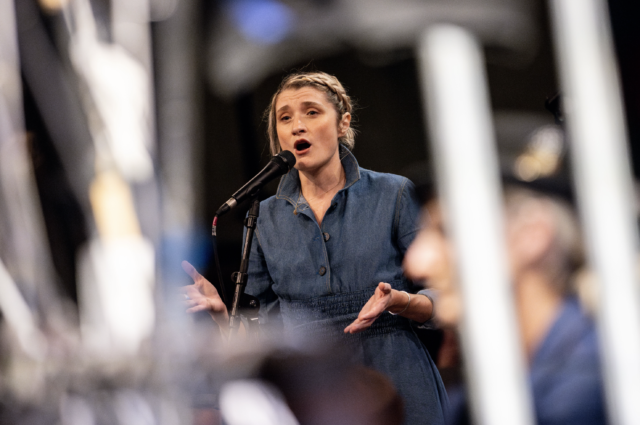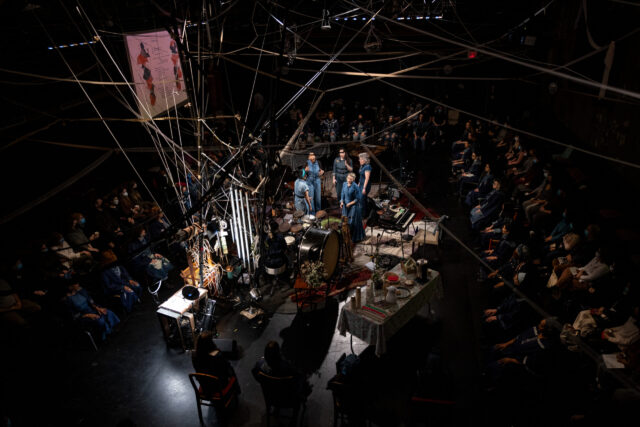
Terce: A Practical Breviary is another gem from Heather Christian (photo by Maria Baranova)
TERCE: A PRACTICAL BREVIARY
The Space at Irondale
85 S. Oxford St., Brooklyn
Wednesday – Sunday through February 4, $50-$150
prototypefestival.org
here.org
Multidisciplinary artist Heather Christian doesn’t just make memorable shows; she creates unforgettable experiences.
Online and at the Bushwick Starr, Animal Wisdom was an intimate and rapturous confessional of music and storytelling, an ingenious journey into the personal and communal nature of ritual and superstition, of grief and loss, of ghosts and, most intently, the fear of death.
At Ars Nova at Greenwich House, Oratorio for Living Things was a gloriously exhilarating celebration of life, art, and nature, an immersive journey through the complex quantum, human, and cosmic time and space of our daily existence.
Christian is now back with the majestic Terce: A Practical Breviary, a reimagining of a monastic 9:00 morning mass as only she can present it, continuing at the Space at Irondale through February 4. “Terce” is the name of the third of the seven canonical hours of the divine office, while a breviary is an abridged liturgical tome of psalms, readings, and hymns.

Terce: A Practical Breviary takes place in a unique environment in the Space at Irondale (photo by Maria Baranova)
Part of the Prototype Festival and commissioned, developed, and produced by HERE, the show takes place in the former Sunday school home of the Lafayette Avenue Presbyterian Church on South Oxford St. in Brooklyn, which Nick Vaughan and Jake Margolin have remade into a welcoming area with two rows of chairs surrounding a central carpeted oval on which there are musical instruments, a mound of dirt, and a complex web of laundry lines emanating from a vertical loom, holding up fabric and household objects that will later be lowered down and used by the performers. Two tables contain tea and cookies that the audience can sample, along with the cast and crew.
As the crowd enters, the thirty members of the community chorus of mothers and/or caregivers are on the upper level, putting on robes that have been individually designed for them by Brenda Abbandondolo; some have embroidery or ruffles, while others are distressed or torn. The band soon saunters onto the stage: Mona Seyed-Boloforosh on grand piano, Viva DeConcini on electric guitar, Mel Hsu on bass and cello, Maya Sharpe on acoustic guitar and violin, Rima Fand on violin, Jessica Lurie on wind, Christian on keyboards, vocal soloists Divya Maus and Kait Warner, and Terry Dame on saxophone and a percussion kit made of pots and pans. All of the performers identify as female; nearly all the props are items associated with what some still consider “women’s work.”
What follows is an exhilarating and powerful sixty-minute service that Christian, in a program note, explains “addresses the Holy Spirit through the lens of the Divine Feminine.” The words to each of the fifteen songs are projected onto large screens on either side of the space, accompanied by drawings by Alice Leora Briggs, Koomah, and Lovie Olivia. While singing, the chorus occasionally marches around the oval and through the audience, at one point breaking out into smaller groups, joining together for communal rituals.
(The lovely choir, which interacts with the audience, consists of Raquel Cion, Marisa Clementi, Ciera Cope, Nadine Daniels, Sandra Gamer, Audrey Hayes, Mercedes Hesselroth, Frances Higgins, Davina Honeghan, Beau Kadir, Rachel Karp, Sarah Lefebvre, Aris Louis, Teri Madonna, Grenetta Mason, Mickaila Perry, Eleanor Philips, Avery Richards, Kayleigh Rozwat, Amy Santos, Kayla Sklar, Sharyn Thomas, Shelley Thomas, Vanessa Truell, Grace Tyson, Madrid Vinarski, Jessie Winograd, and Allison Zhao.)
In the opening “Oratorio,” a singer declares, “You and me and both our mothers / opened up the bottle, / when we opened up our stories / carrying blood to somewhere else.” In “Gardener,” we are told that “the Mother is the garden and the gardener.” In “O Shepherdess,” an adaptation of three prayers by St. Hildegard of Bingen, we hear about “a wound of contrition / a wound of compassion / a wound of the earnest longing for someone.”
The “Psaltery” section is prefaced by the quote “To be divinely feminine is a beatified exhibition of multitasking,” followed by references to Gucci and the DMV; songs include “Poppyseed” and “Mercy Is a Work,” a response to Julian of Norwich. The final part, “Reckoning,” explores gravity, panic, and hurt. Christian sings, “Until we die longing for love / we’re here sensing the chaos / and we don’t know what we are. / When this confused / I submit to my mother / In the door crease of the backseat of the car. / I grasp it only for a moment and in bliss / I understand how everything is all at once / in mercy and in love / and then I lose it.”
Terce: A Practical Breviary is fluidly directed by Keenan Tyler Oliphant (queen, Will You Come with Me?), who superbly manages the large cast and vast space, with lighting by Masha Tsimring (that battles with the sun pouring through the windows at certain times), enveloping sound by Nick Kourtides, and intricate movement by Heather Christian, Darlene Christian, and Oliphant. Heather Christian wrote the libretto, sings several songs, and composed the score, which ranges from pop and gospel to soul and medieval organum.
Christian, who keeps fascinating little trinkets on her piano, never loses anything in her work, pontificating on the fullness and mystery of human experience, from rolling pins and vacuums to lilting choral voices and the ineffable grace of the feminine divine. “I have no artistic restraint / every think I see, I paint / with the image of myself / I am the vine,” she proclaims late in the show, in a processional that is a response to John 15.5. I pray that nothing ever restrains her unforgettable art.